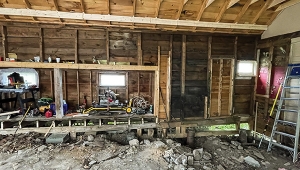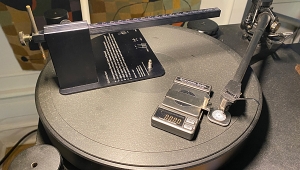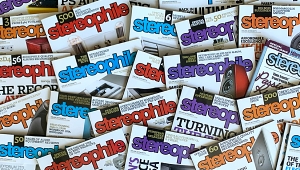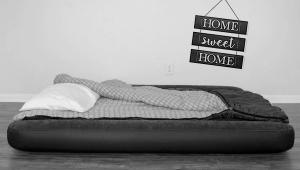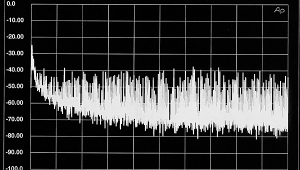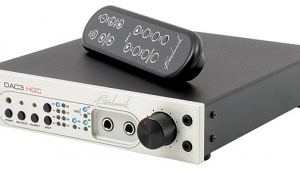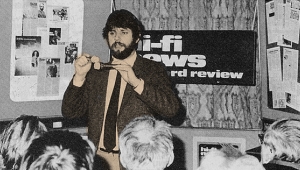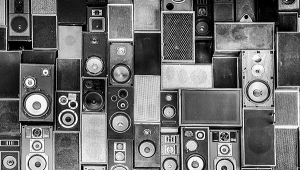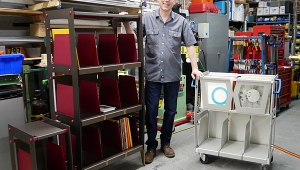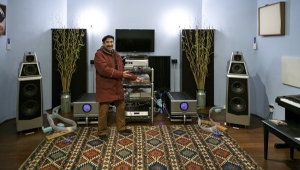| Columns Retired Columns & Blogs |
Illusions, Riddles, & Toys Page 2
Lost dimensions
he other probably insurmountable obstacle to audio realism is the fact that there is no vertical information in any of our recordings. That's right. None. You probably haven't given this much thought, but the whole paradigm of recording technology is built on horizontal references: left-center-right, left-rear, right-rear. Any "stage height" we hear is the result of a happy accident---the right music feeding the right loudspeakers in the right room to a listener in the right mood---our brains playing tricks trying to make sense of the interference patterns resulting from two or more radiating surfaces in the same room, trying to place what is essentially all lateral information in a more familiar three-dimensional context. That's not to say we don't sometimes hear the illusion of height; we do, but it's not based on any intentional cues in the recording.
Footnote 1: See John Atkinson "As We See It" essay, "Is It Real?" in the November 1995 issue.
he other probably insurmountable obstacle to audio realism is the fact that there is no vertical information in any of our recordings. That's right. None. You probably haven't given this much thought, but the whole paradigm of recording technology is built on horizontal references: left-center-right, left-rear, right-rear. Any "stage height" we hear is the result of a happy accident---the right music feeding the right loudspeakers in the right room to a listener in the right mood---our brains playing tricks trying to make sense of the interference patterns resulting from two or more radiating surfaces in the same room, trying to place what is essentially all lateral information in a more familiar three-dimensional context. That's not to say we don't sometimes hear the illusion of height; we do, but it's not based on any intentional cues in the recording.
Although it's possible, with a cluster of microphones and a multitrack recorder, to encode vertical as well as horizontal information, the playback system to reproduce it requires so many channels of amplification and such a cumbersome array of loudspeakers that the cost constraints (not to mention the huge Domestic Interference Factor) rule out any commercial potential. Lucky for us that two channels are all it takes to fool us into thinking a "soundstage" is there. (And one channel is all it takes for musical enjoyment---in some cases, one channel is more realistic than two: play a single-miked recording of a solo voice or instrument through only one speaker and see if you agree.)
Fooling around
All of which leads to the question: Have you ever heard a recording that was not obviously a recording? In other words, have you ever been fooled into believing that you were hearing a live musician? Probably not (footnote 1).
I can think of a couple of instances in which I was momentarily uncertain. I once moved in next door to a guy who was playing some rock music so loud it sounded like a band was practicing in his house. And I remember once going to a friend's for dinner and thinking, as I approached the house, that someone was playing the piano inside---but the moment I walked in the front door, I knew it was the hi-fi. The music was coming from a very good system in another room, where the piano stood, but I could tell it was a recording because I couldn't feel it. A real piano vibrates and resonates when played; you can feel it through the floor, especially a wooden one, in your feet and shinbones, and through your chair if you're seated. Hi-fi systems don't do that.
In fact, good hi-fi systems are designed to not do that. Our credo "The goal of high-end audio is the most accurate possible reproduction of the original acoustic event" is so deeply ingrained in us, and our listening skills so finely honed, that few of us can be tricked into thinking that what we hear through our systems is really real, even though that's what we claim to want. We know it's fake, but nevertheless chase endlessly after the next panacea promising to bring "reality" (whatever that means) a tad closer. Never mind that, increasingly these days, there isn't an "original acoustic event" to reconstruct. The performers often aren't in the same studio at the same time. Sometimes, as in the case of Frank Sinatra's critically lambasted Duets albums, they aren't even on the same continent.
Getting there?
But however impossible the goal, the ideal is laudable. If the day Thomas Edison unveiled his cylinder recorder was the starting line, then we're well past the 50-yard line---maybe even the 80. The goal line of ultimate realism is tantalizingly close. Each incremental improvement brings it a little nearer, but it remains out of reach, and always will.
In that case, is there anything we can do to make our hobby more rewarding, more---to use a frivolous term not in vogue in serious audiophile circles---fun? For starters, how about a moratorium on the use of the word "real," and any of its derivatives or cognates, in the description of recordings or the characteristics of equipment used to play them? Wouldn't that be refreshing? (I believe the correct term is "representational." But a rave review reading "the most representational loudspeaker on the market?" Zzzzzzz.) A few alternatives: surreal, suprareal, hyperreal. And I have a suggestion for those of us afflicted with Critical Listening Syndrome: Lighten up.
Footnote 1: See John Atkinson "As We See It" essay, "Is It Real?" in the November 1995 issue.
- Log in or register to post comments
